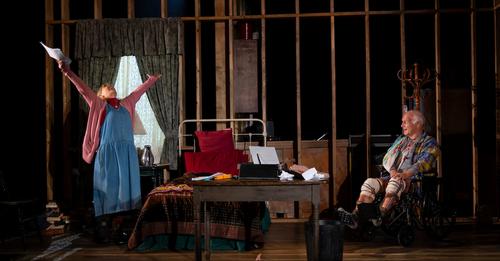
‘Misery’ –Written by William Goldman based on the novel by Stephen King. Directed by Jason Gay. Scenic Design by Riw Rakkulchon; Costume Design by Fabian Fidel Aguilar; Lighting Design by Joey Moro; Sound Design by Daniel Baker/Broken Chord. Presented by Dorset Theatre Festival, Dorset, Vermont, through July 8.
By Shelley A. Sackett
Fans of Stephen King’s 1987 novel or Rob Reiner’s 1990 award-winning film, Misery, should not expect more of the same from Dorset Theatre Festival’s season opener, Misery. Playwright William Goldman has transformed the nail-biter of a scary suspense thriller into a lukewarm reminder of its prodigal self.
The excellent cast, director, and production team make the most of the script and gift the audience with an enjoyable evening of theater, but it was hard not to wonder what the same team might have cooked up had they had better-quality raw ingredients.
The plot remains pretty much the same. Annie Wilkes (a convincing and scene-chewing Kelly McAndrew) lives alone in her gothic family home in the remote backcountry of Silver Creek, Colorado. In one of her guest bedrooms lies the shattered body of best-selling romance novelist Paul Sheldon (Dan Butler), whose car went off the road in a snowstorm a few days ago. It seems Annie, his “number one fan,” just happened to be driving behind him when his car plunged into a ravine. Somehow, she managed to wrest his mangled body from the wreckage and bring it home to convalesce.
Paul awakens from the crash to Annie’s chirping chatter as she fills him in on the last few days. His two legs are badly fractured. She has set them to the best of her ability (Isn’t he lucky she’s a nurse!) and plied him with just enough drugs to ebb his pain while increasing his dependence on her.
Annie is more than an obsessed fan of Paul’s Misery series, about an orphaned 19th-century waif named Misery. She is also a lonely, middle-aged homicidal psychopath who talks to God, is divorced, wanders through her house surrounded by photos of dead relatives, and is an expert at lying and stalking.
As she slowly exposes the levels of her derangement and fixation on the Misery character, it becomes clear she intends to do more than just heal Paul. She intends to imprison him. Until death do them part.
Or at least until he writes another novel, which may just spare his life. Or, toys with Annie in this cat-and-mouse game in which she is recast as a lioness and he as a crippled cricket; then again, it may not.
In any case, write he must, as Paul’s life indeed does depend on it. Unbeknownst to Annie, his most recent installment in the Misery series kills off her beloved heroine. Coincidentally, the book’s release overlapped with Paul’s stay at Annie’s.
As his Number One Fan, Annie, of course, has her local bookstore save her all the new Paul Sheldon books. One day, she bursts into his room, triumphantly brandishing her copy.
Annie is excited beyond her wildest dreams. To be reading her idol’s latest Misery book while he is living in her house brings a creepy Little Bo Peep lilt to her gait. Paul knows (as do we) that Little Miss Sunshine will morph into Chucky the moment she reaches the end of the book. Exactly when that will happen is uncertain, but when it does, Annie’s rage will be of force majeure quality.
For his part, Paul is at first grateful, then wary, and finally determined to escape this real-life misery. His pithy, New York sophisticated banter turns less glib as he realizes the peril he is in and plots his escape, no easy feat for a man with two broken legs and an antique wheelchair for a getaway vehicle.
Goldman has provided Annie’s character with the best lines and the grisliest of backstories, and McAndrew milks it for all it’s worth. When Paul pretends to court her, luring her to a romantic dinner as part of his escape plan, Annie sheds her overalls and boots and shows up in a dress befitting Laura Ingalls from “Little House on the Prairie.”. It would be a touching scene if it weren’t for the sheen of Bette Davis’s Baby Jane character with which Annie powdered her nose.
Butler, a talented actor with star-studded credits, does the best he can with the cardboard Paul. Riw Rakkulchon’s revolving set creates a folksy, cozy country home that would be at the top of anyone’s Airbnb list. Thanks to dramatic lighting and sound design, the scenes come to creepy life. Kudos, too, for a system that allows the actors’ words to be easily heard and, more importantly, understood, something increasingly and annoyingly rare in too many Boston theaters.
It’s hard not to miss the intensity and tension generated by the Misery novel and film, but for those in the mood for a Misery-lite summer version that recasts the horror tale as a more whimsical melodrama, Dorset Theatre Festival has just the ticket. For more information and to buy tickets, visit https://dorsettheatrefestival.org

